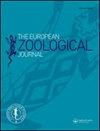浮游鱼类对聚苯乙烯微塑料垂直通量的影响
IF 1.4
4区 生物学
Q2 ZOOLOGY
引用次数: 1
摘要
摘要许多研究分析了微塑料颗粒在各种水生栖息地的分布和浓度,并估计了它们如何影响残余生物群。关于生物体(如鱼类动物群)如何影响水中MPs的定量和定性特征的研究显然较少。因此,我们研究的目的是测试鱼类是否能增加MPs对沉积物的垂直通量。这将是沉积速率增加和鱼类在同时存在热梯度(进而是水密度梯度)的情况下垂直迁移产生的主动迁移共同作用的结果。我们在热分层双垂直柱中进行了八个为期5天的实验,该柱填充有尺寸分别为25和250µm的聚苯乙烯珠悬浮液,初始密度分别为1000和200×L−1。在每个实验中,我们在每个柱子的三个不同深度放置了沉积物捕获器,在其中一个柱子上放置了四条浮游鱼。在实验过程中,我们监测了鱼类的分布情况。在实验结束时,我们确定了沉积物捕集器和水中MP的数量和碎屑的数量。我们发现,浮游鱼类的存在显著增加了MPs向沉积物的垂直通量,并降低了水柱中MPs的密度。这些影响似乎更可能是由于鱼类活动导致MPs的沉积速率增加,而不是由于它们的主动运输,因为实验变体中的MPs比对照中更大程度地被碎屑覆盖,并且鱼类留在水柱的地下层中。我们的研究似乎是第一次展示鱼类对水生生态系统中MPs浓度和分布的影响。亮点鱼类觅食活动增加了PS MPs的沉积。鱼类的觅食活动降低了水柱中PS-MP的浓度。这项研究似乎为鱼类对水生环境中MPs分布的影响提供了第一个实验证据。本文章由计算机程序翻译,如有差异,请以英文原文为准。
The effect of planktivorous fish on the vertical flux of polystyrene microplastics
Abstract Numerous studies have analyzed the distribution and concentration of microplastic particles (MPs) in various aquatic habitats, and estimated how they affect residual biota. Decidedly less research concerns how organisms (e.g. ichthyofauna) affect the quantitative and qualitative characteristics of MPs in the water. Therefore, the aim of our study was to test, if fish can increase the vertical flux of MPs to sediments. This would be the result of the combined effect of increased sedimentation rate and the active transport resulting from vertical migration of the fish in the simultaneous presence of a thermal gradient (and in turn water density gradient). We conducted eight 5-day-long experiments in thermally stratified twin vertical columns filled with a suspension of polystyrene beads of 25 and 250 µm in size, with initial density of 1000 and 200 × L−1, respectively. In each of the experiments, we placed sediment traps at three different depths in each of the columns, and four planktivorous fish in one of them. During the experiments, we monitored the distribution of fish. At the end of the experiment, we determined the number of MPs and the amount of detritus in both sediment traps and water. We found that the presence of planktivorous fish significantly increased the vertical flux of MPs to sediments and decreased the density of MPs in the water column. These effects seem to be more likely due to the increased sedimentation rate of MPs due to the fish activity, rather than to their active transport, as MPs in the experimental variant were covered with detritus to a greater extent, than in the control, and the fish remained in the subsurface layer in the water column. Our study seems to be the first one showcasing the effect of fish on the concentration and distribution of MPs in aquatic ecosystems. Highlights Fish foraging activity increased the sedimentation of PS MPs. Fish foraging activity decreased the PS MP concentration in the water column. The study seems to provide the first experimental evidence on the effect of fish on the distribution of MPs in aquatic environments.
求助全文
通过发布文献求助,成功后即可免费获取论文全文。
去求助
来源期刊

European Zoological Journal
Agricultural and Biological Sciences-Animal Science and Zoology
CiteScore
3.10
自引率
5.60%
发文量
80
审稿时长
30 weeks
期刊介绍:
The European Zoological Journal (previously Italian Journal of Zoology) is an open access journal devoted to the study of all aspects of basic, comparative and applied protozoan and animal biology at molecular, cellular, tissue, organ, organismal, population, and community-ecosystem level. Papers covering multiple levels of organization and integrative approaches to study animal form, function, development, ecology, evolution and systematics are welcome. First established in 1930 under the name of Il Bollettino di Zoologia, the journal now has an international focus, reflected through its global editorial board, and wide author and readership.
 求助内容:
求助内容: 应助结果提醒方式:
应助结果提醒方式:


